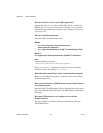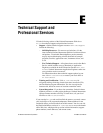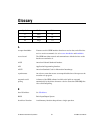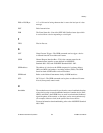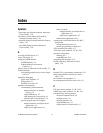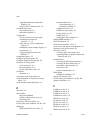Glossary
© National Instruments Corporation G-3 NI-488.2 User Manual
EOS or EOS Byte A 7- or 8-bit end-of-string character that is sent as the last byte of a data
message.
EOT End of transmission.
ESB The Event Status bit—Part of the IEEE 488.2-defined status byte which
is received from a device responding to a serial poll.
F
FIFO First-in-first-out.
G
GET Group Execute Trigger—The GPIB command used to trigger a device
or internal function of an addressed Listener.
GPIB General Purpose Interface Bus—This is the common name for the
communications interface system defined in ANSI/IEEE
Standard 488.1-2003 and ANSI/IEEE Standard 488.2-1992.
GPIB address The address of a device on the GPIB, composed of a primary address
(MLA and MTA) and perhaps a secondary address (MSA). The GPIB
board has both a GPIB address and an I/O address.
GPIB board Refers to the National Instruments family of GPIB interfaces.
GTL Go To Local—The GPIB command used to place an addressed Listener
in local (front panel) control mode.
H
handshake The mechanism used to transfer bytes from the source handshake function
of one device to the acceptor handshake function of another device. DAV,
NRFD, and NDAC, three GPIB lines, are used in an interlocked fashion to
signal the phases of the transfer, so that bytes can be sent asynchronously
(for example, without a clock) at the speed of the slowest device.
For more information about handshaking, refer to the ANSI/IEEE Standard
488.1-2003.






